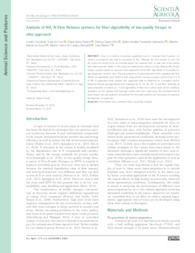Analysis of NH3-N slow release systems for fiber digestibility of low-quality forage: in vitro approach.
Analysis of NH3-N slow release systems for fiber digestibility of low-quality forage: in vitro approach.
Author(s): CRUZ, C. C. T. da; PEREIRA, E. I.; SATO, P. S.; GUIMARÃES, G. G. F.; SOUZA, G. B. de; BERNARDI, A. C. de C.; OLIVEIRA, C. R. de
Summary: Urea is a common non-protein supplement used in ruminant feed; however, excessive consumption may lead to poisoning by NH3. Although the slow release of urea into the rumen has shown to be an essential aspect for ruminant feed, to date only a few studies have addressed this matter. In this study we examined the influence of five different NH3-N slow release systems based on clay-urea nanocomposites on the fiber digestibility of low-quality forage (sugarcane straw) in vitro. Physical properties of nanocomposites were evaluated and their effects on digestibility were tested in vitro using pristine urea as a positive control (level of 1 % of DM of sugarcane straw sample) and sugarcane (with no additives) as a negative control. Ammonia release and digestibility were evaluated at 12, 24, 36, 48, 72 and 96-h. Generally, all nanocomposites increased (p < 0.05) digestibility of fiber over control under all the conditions stipulated, but the samples with hydrogel content were more expressive. We concluded that an ideal release rate and optimum environment for microbial synthesis are necessary to maximize the digestion of sugarcane.
Publication year: 2020
Types of publication: Journal article
Keywords: Non protein nitrogen, Ruminants feed, Slow release urea
Observation
Some of Embrapa's publications are published as ePub files. To read them, use or download one of the following free software options to your computer or mobile device. Android: Google Play Books; IOS: iBooks; Windows and Linux: Calibre.
Access other publications
Access the Agricultural Research Database (BDPA) to consult Embrapa's full library collection and records.
Visit Embrapa Bookstore to purchase books and other publications sold by Embrapa.

